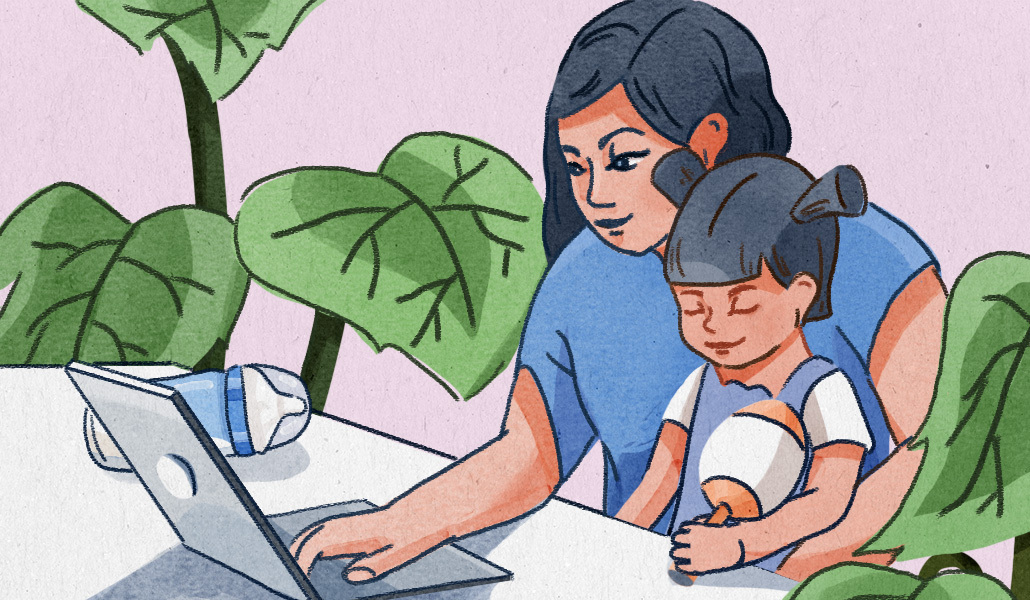Four years after lockdown: The enduring strain of working parents’ juggle between career and family

This article is part of a series examining the various ways that the overhaul of organizations’ working models around the world, triggered by the coronavirus pandemic, is affecting working parents with desk-based jobs, and how their relationships between their kids and jobs have changed since the pandemic years. More from the series →
Four years ago Nancy Lengthorn received a text from another mom telling her that her six-year-old twins had taken photos of their butts and coded them into their school’s homeschooling app – as the prize for any classmate who could complete a maze game on it.
At the time, both Lengthorn and her husband were working 14+ hour days from home, along with the rest of the desk-based working world after national coronavirus lockdowns kicked in. Their four kids, including a nine-year-old and an 11-year-old, were all at home too.
“I didn’t even really know this mom, and I was about to start work. I was working insane hours at the time and was unable to homeschool. So when everyone was asking me ‘How is your homeschooling going?’ I just had horrible pangs of guilt, because we just couldn’t do it. I remember screaming and trying to get into the app, my eldest son couldn’t bear the tension and was pacing up and down saying ‘I don’t like this.’ It was my middle daughter who remained calm and helped us access the app.”
Even once working from home had become more embedded, things didn’t get easier for parents. A few months later, in May 2020, Lengthorn received a call from the twins’ teacher who wanted to talk to her about their engagement. It turned out that while they’d appeared to be at their laptops at home, doing their schoolwork, they were actually watching soccer matches – for two weeks. “I remember bursting into tears because I had nothing in the locker. I was in meetings all day and I knew I couldn’t do anything about their engagement,” said Lengthorn, who at the time was head of inclusion and belonging at media advertising agency Mediacom U.K., part of holding group WPP.
That sense of guilt still haunts many working parents, who felt they were unable to give their children the necessary attention during the majority of 2020 and much of 2021, as they had to saddle the burden of homeschooling while keeping their productivity up at work.
Naturally, there was a flip side. Suddenly, bouncing a baby in a sling, while doing a Zoom or Teams call with colleagues or clients, wasn’t regarded as unprofessional, but delightful. Having a toddler yell out something personal or embarrassing while on a team meeting became a great ice breaker, or a shared moment of hilarity and helped boost morale at what was a time of great strain for everyone.
Fast forward to today, the peak of coronavirus is in the rearview, leaving the picture for working parents, thankfully, very different. The fear of not being (psychologically, rather than physically) present for their kids because they’re so stressed with, or distracted by work still persists, but for many the subsequent normalization of working from home has been of huge benefit to working parents in desk-based jobs.
Lengthorn, who is now global culture and learning lead at digital ad agency BrainLabs, enjoys the flexible working arrangement she currently has. She chooses to be in the office Tuesday through Thursday but can be available to her kids a lot more through the day on Mondays and Fridays, while she works from home.
We spoke with dozens of working parents in the U.K. and U.S., across multiple industries, to gauge how they’re getting on, four years after the coronavirus pandemic changed traditional workplace norms. It turns out that, while there are many positives, there is an underlying, silent struggle occurring when it comes to balancing family and work. And the pressure of rigid return-to-office mandates is only adding more pressure.
Flexible work for parents no longer a precious privilege, but biases remain
Stephanie Bennett was managing director of a U.K.-based social media agency for several years before she had her first daughter in 2021. She was one of those parents bouncing her baby in a sling while on meetings, with her laptop perched on a cat tree. Reactions could be mixed to that, she recalled. While many loved the human element and shared details of their own home lives back, others still deemed it unprofessional, she said.
As a single mother, Bennett’s need for flexibility was non-negotiable. She decided to look for part-time work that better suited the time flexibility she needed. So a year ago she decided to put her plan to buy a house on ice and lean on her savings to kick off a freelance career.
“I’ve had some good connections who are old colleagues or clients of mine. But the industry is really tough at the moment,” she said. “And going from a leadership position into the marketplace – I call myself a jack of all trades and a master of some.” When she does look for permanent jobs, they need to be on a part-time basis so she can juggle the numerous sick days her daughter has, and be there for pickups from nursery. But often a job advertised for three days compresses the work of five. “My skills are transferable, but trying to find a [suitable] job is like a needle in a haystack,” she said.
She often gets asked the same questions: can’t you get a childminder, or find wraparound care? “For starters, I don’t want to,” she said. “I waited until I was 41 to have my daughter. I gave a lot of time to my career. Now she’s here I want to have that time with her. Plus, financially it’s so expensive — it eats away at everything. And even then, if your child gets sick or you get sick [which is every other day when they’re in childcare] you can get a ‘oh for goodness sake’ kind of attitude. Whereas with freelance, as a solo parent, I can juggle my days and hours around and still be able to deliver on everything, without judgment.”
Now that she has stepped out of full-time employment and had a child, she can see that there is a “massive swell” of women – particularly in industries like comms and PR – going freelance or launching their own businesses because there aren’t enough employers that trust that they can get the work done on flexible hours.
“You can have a strong [maternity/flexible] policy but if people in the business don’t understand the policy, or respect it, that becomes an issue in itself,” she said. “The industry is still failing us, and the nation is still failing us in terms of the views and perceptions of what a career-driven woman is allowed to do, or should be doing, or should have permission to do if there are sickness days or anything like that,” she added.
Francesca O’Connor is the mother of two kids (3, 5) and an experienced senior leader, having held several executive roles and been on the board for multiple PR firms based in the U.K. She had her second baby during lockdown and said that her ingrained high work ethic almost ran her into the ground while juggling the needs of two young children. She has spent the last five years “trying to make it work” with employers but has lately decided to launch her own business.
“I’ve had to probably burn out twice to realize how I reframe success in my mind on how I find balance so that I’m not continually chasing the same ambition that I had before I had two kids,” she said. “I would never ever want to say to women that it’s not possible because that feels so negative, but more that sometimes there’s an acceptance that has to come when life is very different and your boundaries have to be very different or you end up self-loathing quite hard and not doing any one thing very well.”
The guilt that comes with not feeling like you’re handling either job or family well, runs deep with many parents. O’Connor, who is now an executive coach, stressed that she believes senior women are particularly hard on themselves, and that it can take several years before a woman’s hormones rebalance after having kids, which makes the work-life juggle seem that bit harder.
“I spent five years either pregnant or postnatal (postpartum depression.] That is so many mental and physical changes going on in your body that no one can ever really understand unless you’ve been through it,” she added.
Boundary erosion and crippling expectations
Louise Serrano Burrows, global digital marketing director at ad agency EssenceMediaCom has two children, the second born during lockdown. She said there was a “striking duality” between securing approval of flexible working when she returned from maternity leave in 2018 compared to post-Covid and national lockdowns. Within a few months, what had seemed a precious privilege for decades, became more an inherent right. She believes that four years on, the shift in mindset around flexible working for all – not just parents or caregivers – has positively benefited how she balances her professional and family life enormously.
Yet despite the numerous benefits of flexibility, “there exists a subtle challenge — the delicate fusion of professional and parental realms,” said Serrano Burrows. “The convenience of working from anywhere, facilitated by modern technology, often blurs the lines between the end of the working day and the start of dedicated parent time. In the midst of family moments, I catch myself responding to emails or fielding calls, unintentionally compromising the depth of my presence with my children.”
Serrano Burrows believes this is a temporary transition, however. “The art of balancing work and family is a skill that I think can be refined over time,” she said.
Numerous dads we spoke to for this article, both on and off record, expressed the same paradox: they’re euphoric that they get more hands-on time with their children, but the in-betweenness of hybrid setups (especially if there is a lack of intention around why they’re going into the office) is leading to a sense of frustration. Add in the current pressure put on parents by schools, extreme sleep deprivation, endless viral infections along with the needs of their jobs, and the result is that many working dads also feel the crunch.
Rowan and Matt Hamill have two young children together. Their daughter is in her first year of school and goes to breakfast club four mornings a week, and after-school club three times a week, and their son is in daycare three and a half days a week. They also use a part-time nanny to help with Monday and Friday mornings and the rest they juggle. It’s a costly business.
“It’s a daily debate, about who has important meetings, what needs doing with each child to get them to and from school/nursery, what stuff they need in their bags (library books, snacks, water bottles, change of clothes),” said Matt Hamill, U.K. sales director at advertising tech firm TapTap Digital.
“One of the unexpected consequences of working from home is the lack of commute, which I realize now I’ve used to separate myself from work/home and switch off,” he added. “Working from home, picking the kids up, still being available via Slack and emails – often means I’ve got a foot in work, and a foot being a dad, which doesn’t work and probably leads to me feeling like I’m failing.”
In the last two years, Rowan – who is business development director at ad tech firm Adswizz – lost her parents to illnesses and cared for them for a long time before that. “That juggle of looking after them when one of them was sick or hospitalized was enough to make me want to pop with stress,” she said.
She believes that we’re living in a society of guilt. “Try to let go of the guilt that your colleagues or bosses think less of you for not being omnipresent and the same for your children.” Some weeks it will go smoothly, you can finish work at a reasonable time and get some quality time at home with the kids and everyone gets a decent night’s sleep. Others, one of you is traveling to the U.S. and everyone at home gets struck down with gastroenteritis, as Rowan said had happened to them before. “You just have to roll with the flow and try to find a company that will treat you like an adult and trust that you’re getting your work done.”
But employer expectations do have a part to play in this game of guilt, and can throw work-life balance entirely out of whack, stressed Verena Hefti, founder of U.K.-based working parent social enterprise, LeadersPlus, created to help parents with families progress into senior leadership. “There is a huge problem with employers getting workload wrong. And I think that’s a hangover from the pandemic, in that we are so used to people working all hours today because they had to, and that means post-Covid that parents are working extremely long hours and getting burned out. Parents are replying to work emails during bath time, which you know, is dangerous.” But such is the sense of pressure and employer workload expectations, she stressed.
That struck a chord with a senior executive who works at a global consumer goods brand, who agreed to speak on condition of anonymity. He spoke about the times he’s had to do numerous presentations to large groups of people while worrying that he’s infecting the room as he’s caught the same virus as his toddler. “No matter how flexible your employer is, you still have to do the work,” he said.
Finding supportive employers
Part of that is also down to the fact that parents don’t lose their work ambition when they become parents – just their sleep, (and occasionally perhaps, their sanity.) All 25 women and men we spoke to for this series expressed a love of their work, and setting a good example for their kids – they just wanted to be able to do it in a way that didn’t cripple them.
Two-thirds of 878 parents LeadersPlus recently polled said they want to progress within the next two years, and 86% within five years. But a mere 30% believe their employers will promote them, despite the fact 50% believe being a parent has made them more productive, so it shouldn’t be a barrier to their work.
Hefti said that since the pandemic, teachers’ expectations of parents are also higher – a hangover from the homeschooling days when they were expected to be closely involved with schoolwork. And every parent spoken to for this editorial series, both in the U.S. and U.K. strongly criticized the crippling childcare costs, which have skyrocketed since the pandemic. One source likened the cost of having two children in daycare to having a second mortgage. And while some of the more progressive employers offer on-site daycare – they’re in a sharp minority.
“There are so many employers who are absolutely failing working parents and working parents are making choices – they are moving to other employers who are supportive,” said Hefti.
Of course, it’s one thing having a strong policy, but ensuring the essence of that decent paternity or flexible policy, for instance, is infused into organizational culture so that people stamp out their own biases, is a different matter. Hefti calls this a kind of “informal support” and the lack of it from employers is a “massive problem,” she added.
This kind of informal support could be around unexpected crises — having a sick child that needs to be taken to the hospital, or when schools are closed unexpectedly due to a gas leak or a snow day, or even expected vacation time if there isn’t always budget for the kids to be constantly entertained. Or it can even be something as seemingly benign as dealing with nits – something O’Connor had just spent the last three days trying to eradicate at the time she spoke with WorkLife for this article.
“Parents really need that informal flexibility, and it keeps them sometimes from applying to more senior roles because they think they have a really good relationship with their manager now. And so they don’t apply for a more senior role because they’re not sure if they will have the same flexibility,” said Hefti.



